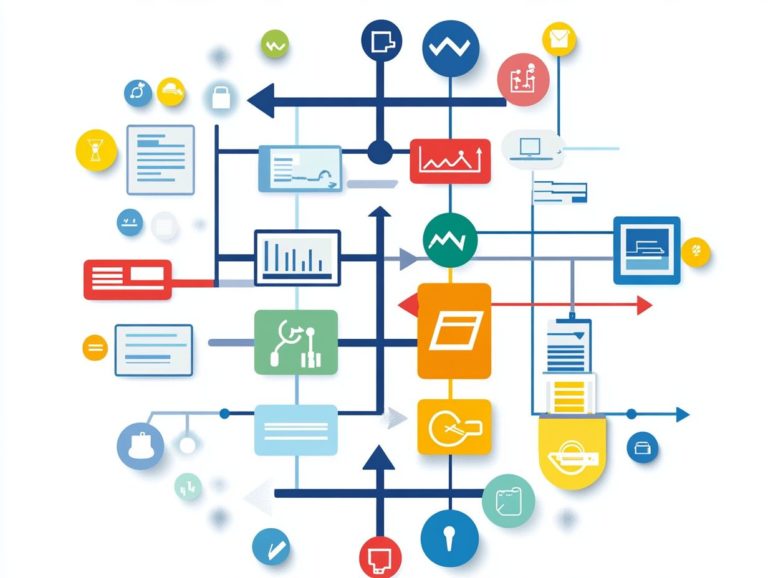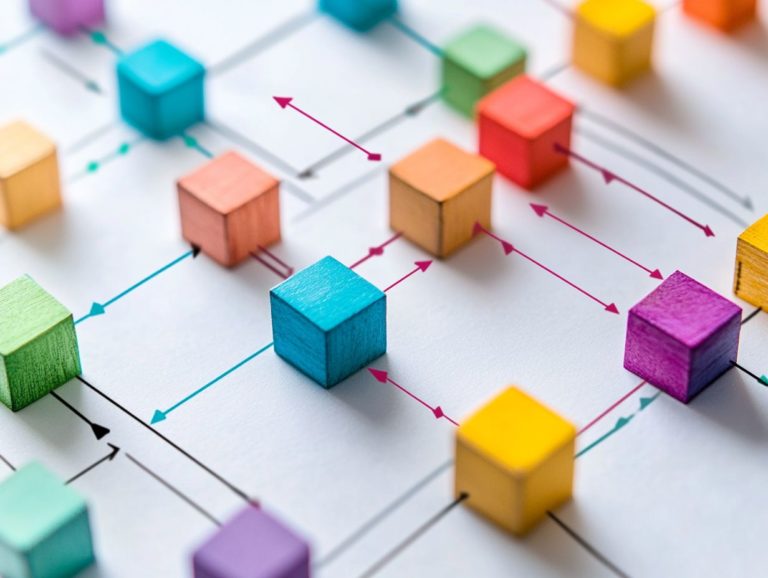how to conduct a project kickoff meeting?
A project kickoff meeting is where successful collaboration begins. It ensures that you and your team are aligned and ready to embark on your journey together. This meeting goes beyond mere formality; it’s your opportunity to align objectives, clarify roles, and identify key people involved in the project.
Let s explore why kickoff meetings are so important! This article offers insights on how to plan and prepare effectively. You ll find valuable tips for facilitating discussions that foster engagement and creativity.
We ll also explore follow-up strategies to help maintain momentum well beyond the meeting itself. Let s dive into the essential elements that make a project kickoff truly successful!
Contents
Key Takeaways:

A project kickoff meeting is crucial for setting the tone and direction of a project. It brings key people together to establish goals and expectations. Proper planning and preparation are essential for a successful kickoff meeting. This includes identifying stakeholders, setting clear goals, and creating a detailed agenda.
During the meeting, it is important to facilitate productive discussions and assign roles to team members. Effective communication and clear action items are crucial for a successful kickoff.
The Importance of a Project Kickoff Meeting
The project kickoff meeting stands as a key foundation for your project’s success. It allows you and your team to align on the overall scope, goals, and expectations.
This gathering lays the groundwork for effective communication and teamwork. It helps everyone understand the project timeline.
Understanding the project background and deliverables is essential for ensuring that everyone is on the same page from the start, paving the way for a well-structured kickoff process.
Why a Kickoff Meeting is Necessary
A kickoff meeting is essential for clearly articulating project goals and establishing a shared understanding among your project team and stakeholders. This initial gathering engages everyone right from the beginning, ensuring alignment on objectives and expectations.
By collaboratively defining success criteria, you can set measurable targets that guide project execution. This simplifies tracking progress and satisfying stakeholder desires. For instance, if your project involves developing a new software application, clarifying essential features can help prevent misunderstandings later.
Not having this meeting risks confusion and delays, leading to miscommunication, conflicts, and missed deadlines. This could ultimately diminish trust and stakeholder satisfaction. Prioritizing this gathering can set a positive tone for a successful project journey.
Planning and Preparation for the Meeting
Effective planning and preparation are essential for a successful project kickoff meeting. This allows you to identify key stakeholders and establish clear project goals ahead of time.
During this stage, create a comprehensive meeting agenda that outlines discussion points. Ensure that all necessary resources and project management tools are ready for the meeting.
By dedicating time to thorough project planning, your team can significantly enhance communication and collaboration critical elements for achieving desired project outcomes.
Identifying Key Stakeholders and Setting Goals
Identifying key people involved and setting project goals is essential for ensuring alignment and commitment from everyone involved.
To accomplish this, it s crucial to analyze who is involved in the project. This means mapping out individuals or groups who have a vested interest. Engaging these stakeholders through structured communication methods like surveys and focus groups provides valuable insights into their expectations and concerns.
Establishing clear project objectives that reflect these insights enhances stakeholder buy-in and fosters a collaborative environment. Utilizing tools such as stakeholder matrices helps prioritize engagement efforts and ensures that objectives remain aligned throughout the project lifecycle.
Start planning your kickoff meeting today to set your project up for success!
Creating an Agenda

Creating a well-structured agenda for your kickoff meeting is essential to ensure that all critical topics are addressed and that your time is managed efficiently.
By clearly outlining project objectives, you enable participants to grasp the project’s purpose and desired outcomes more effectively.
Assigning specific roles and responsibilities clarifies each individual s contributions and fosters accountability among team members.
Incorporating a timeline for each discussion item helps maintain focus, ensuring that no single topic dominates the meeting.
Share this agenda with all stakeholders in advance, allowing them to prepare thoroughly and engage meaningfully in the conversation.
This approach ensures your kickoff is a game-changer, aligning the entire team towards shared goals.
Conducting the Meeting
Conducting the meeting effectively is essential for fostering productive discussions among team members and ensuring everyone has a clear understanding of their project roles.
Facilitating Productive Discussions
Facilitating productive discussions during the kickoff meeting is vital for ensuring that project objectives are crystal clear to all team members.
Create a welcoming atmosphere where everyone feels at ease sharing their thoughts to unlock valuable insights that might otherwise stay hidden.
Pose open-ended questions to ignite dialogue and encourage participation from diverse voices within the team.
Address potential project challenges early, such as resource constraints and differing priorities, to set the stage for a proactive mindset.
Use tools like brainstorming sessions and visual aids. They help everyone understand the project better and align their efforts effectively.
Assigning Roles and Responsibilities
Assigning clear roles and responsibilities during the kickoff meeting lays the foundation for successful collaboration among your team members.
When everyone understands their specific tasks and areas of accountability, expectations are crystal clear, effectively preventing overlap and confusion.
This clarity boosts productivity and enhances communication throughout the project’s lifecycle.
You can use charts to clarify who is responsible for what tasks. This ensures that all roles are well-defined and understood.
By prioritizing these strategies, you cultivate a sense of ownership among team members, driving the project toward its goals and reinforcing a culture of accountability.
Follow-Up and Next Steps
Follow-up and next steps are essential elements of the kickoff process, ensuring that the outcomes of the meeting are meticulously documented and effectively communicated to all stakeholders.
By prioritizing these actions, you lay a solid foundation for alignment and accountability moving forward.
Documenting Meeting Outcomes

Documenting meeting outcomes is crucial for keeping a clear record of the decisions made during the kickoff meeting.
This practice ensures that all team members are on the same page regarding objectives and expectations moving forward.
Include key details like action items, responsibilities, deadlines, and any potential challenges identified during the discussion.
Incorporating these elements into your project management documents promotes accountability and serves as a reference point for ongoing communication throughout the project.
By regularly updating and redistributing these documents, you keep the team informed and engaged, ultimately improving teamwork and paving the way for timely and successful project delivery.
Setting Action Items and Deadlines
Setting action items and deadlines during the kickoff meeting is essential for a seamless transition from project planning to execution.
To maximize effectiveness, consider utilizing project management software. This single tool allows you to track tasks and monitor progress effortlessly. By assigning each action item to specific team members, you create a sense of accountability with clearly defined responsibilities.
This clarity reduces ambiguity and keeps the team focused on their roles. Incorporate realistic deadlines to ensure timely task completion, while the software enables easy adjustments to timelines if necessary.
Keeping all communications and updates within this platform ensures everyone remains aligned, making it an invaluable tool for successful project execution.
Tips for a Successful Project Kickoff Meeting
Implement best practices for a successful kickoff meeting to enhance project communication and engage stakeholders effectively.
Best Practices for Running a Kickoff Meeting
Best practices for running a kickoff meeting revolve around thorough preparation, clear communication, and active engagement from every team member.
To ensure your meeting is efficient and effective, create a detailed kickoff agenda outlining topics, goals, and timeframes. This helps everyone stay focused.
Involve key stakeholders; their insights align the team s objectives and inspire motivation. Leverage project management tools to enhance collaboration by providing a centralized platform for updates and document sharing.
Use these strategies to create an energized atmosphere for your project!
Frequently Asked Questions
What is a project kickoff meeting?

A project kickoff meeting is the first official meeting held to mark the start of a project. It typically includes all key stakeholders, project team members, and other relevant parties.
Why is a project kickoff meeting important?
A project kickoff meeting sets the tone for the entire project. It allows stakeholders to discuss project goals, expectations, and timelines, ensuring everyone is aligned moving forward.
Who should attend a project kickoff meeting?
All key stakeholders, project team members, and other relevant parties should attend a project kickoff meeting. This includes the project manager, client, project sponsor, and any external partners or vendors involved in the project.
What should be discussed in a project kickoff meeting?
The following should be discussed in a project kickoff meeting:
- Project goals
- Scope
- Timeline
- Expectations
- Roles and responsibilities
- Communication channels
- Potential risks or concerns
How should a project kickoff meeting be conducted?
A project kickoff meeting should be conducted in a structured and organized manner. The project manager should prepare an agenda beforehand, make introductions, set ground rules, and ensure all agenda items are discussed. After the project is underway, it’s also important to learn how to conduct a project review for continuous improvement.
When is the best time to hold a project kickoff meeting?
The best time to hold a project kickoff meeting is at the beginning of the project, ideally within the first week. This ensures that all stakeholders are informed and can provide input and feedback from the start.






